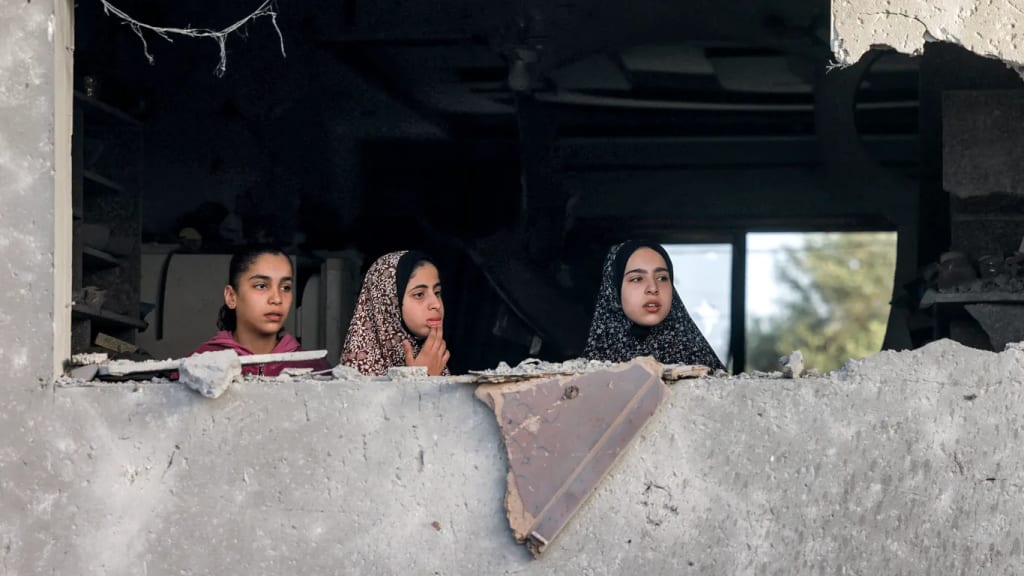
Three senior Israeli officials told Axios that top Israeli intelligence and military officials met with Egypt's intelligence chief and other important officials on Wednesday in Cairo to discuss the possibility of an Israel Defense Forces operation in Rafah.
Why this matters: Egyptian officials fear that thousands of displaced Palestinians may enter their country as a result of an Israeli operation in the southern part of Gaza City, possibly resulting in a border breach that jeopardizes Egypt's security.
In both public and private discussions with Israel, senior Egyptian officials have stated that such a situation would cause a rift in relations with Israel and might even put the peace deal between the two countries in jeopardy.
One of the fundamental requirements for Israel's military action in Rafah, according to Israeli officials, is close military and diplomatic coordination with Egypt. This is especially true given Israel's goal to seize control of the Philadelphi corridor, which is located next to the border between Egypt and the Gaza Strip.
General Intelligence Service of Egypt, Egyptian officials, and IDF spokespeople declined to comment.
Rewind: Since October 7, General Harzi Halevi, the IDF chief of staff, and Shin Bet chief Ronen Bar have made two trips to Egypt to talk about potential operations in Rafah.
Osama Askar, the Egyptian Chief of Staff, and Abbas Kamel, the head of Egyptian intelligence, met with Bar and Halevi.
They also talked about negotiations for a temporary ceasefire and the release of hostages detained in Gaza. One of the main peace brokers between Israel and Hamas is Egypt.
Axios was the first to report on the earlier visit in mid-February, which was intended to send a message that Israel would take action to prevent thousands of Palestinian refugees from flooding into Egypt as a result of the Rafah operation.
Current situation: Israel has been threatening to invade Rafah for weeks, but the United States and other nations are resisting because of the estimated one million Palestinians who have been forced to flee their homes and the ongoing humanitarian crisis in Gaza.
High-ranking Israeli officials reported that preparations for the civilian population's evacuation from Rafah have advanced significantly. The officials claim that big tent shelters have been erected by Egypt and the United Arab Emirates between Rafah and Khan Yunis, as well as in the Muassi neighborhood northwest of Rafah along the coast.
"Everyone is waiting on Netanyahu's order to begin pulling out Rafah's civilian population. At his desk, it is parked. He must find a solution with both of them the Egyptians and the Americans," stated a senior Israeli official.
In the background: A senior U.S. official stated that the plans the IDF submitted to the U.S. Department of Defense in recent weeks included a neighborhood-by-neighbor operation in Rafah rather than a full-scale invasion of the city.
The U.S. official stated that each neighborhood would be evacuated independently in accordance with the Israeli plan that was submitted to the Biden administration, rather than requiring the immediate evacuation of all city residents.
Senior U.S. and Israeli officials reported that, last Thursday, during a virtual meeting between Israel and the U.S., Israel presented its humanitarian plan regarding the Rafah operation.
U.S. officials stated that Israel stressed to them during the meeting that the decision to begin an operation in Rafah would be "conditions-based and not time-based" and related to the humanitarian situation there.
Two weeks after: The IDF left the Khan Yunis area, 250,000 Palestinians, out of the one million who sought shelter in Rafah, according to Israeli officials, have already left the city.
Senior U.S. officials stated that since they learned that Khan Yunis' homes and infrastructure had been completely destroyed, they had been keeping an eye on some of those individuals' return to Rafah in recent days.
What they're saying: According to senior U.S. officials, Israel has clearly modified its strategy, is paying attention to the Biden administration's concerns and criticism, and is adjusting its plans regarding Rafah in light of those developments.
Despite this, according to U.S. officials, the Biden administration is still worried about an Israeli operation in Rafah and brought up at least ten questions during the most recent virtual meeting for which it would like answers from Israel.
"There has been progress, but much more needs to be done. Everything appeared to be in order in the IDF PowerPoint presentations that we saw. How it will appear in practice is the question, according to a U.S. official.





Comments (1)
I'm confused because this is published in the Fiction community. So is this not real? Is this just a story?